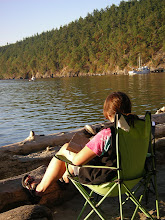Likes:
- cranberry and white chocolate chip scones
- Oregon Chai – instant chai tea latte mix … simple and tasty
- Starbucks Pumpkin Spice Latte (addictive sweetness, similar to but better than their Chai Tea)
- writing with gel pens
- wearing scarves
- sidewalks carpeted with golden-orange leaves
- Rockwood Boulevard
- artsy wine bottle labels
Indifferent:
- Houses with Halloween decorations
Recently spotted within a walk or bike-ride radius of our house -
- Creative: a historic home with the simple decoration of Dracula’s crooked tombstone next to the stone steps leading up to the house
- Tacky: blow-up ghosts
- Cliché: white cotton fake spider web stuff stretched everywhere
- Freaky: a collection of mannequin heads decorating the front porch (seriously, there were about 15-20 heads!)
Dislikes:
- taking I-90 to work and feeling like a “commuter”
- “decrapitating” the backyard (i.e., picking up Emerson’s poo)
* * *
If you come to our house on Halloween you might just get…a juice box or Sour Skittles.
* * *
In the book bag:
Always Beginning – Essays on a Life in Poetry, by Maxine Kumin
Published by Copper Canyon Press (one of my favorites), 2000.
This book is divided into six parts. I’m skipping around as the essay titles interest me. So far I’ve enjoyed:
“Interstices”
“Swimming and Writing”
“Motherhood and Poetics”
“For Anne at Passover” (Kumin’s analysis and explanation of this background personal context of this poem by the same name.)
. . . and I realize now that if I listed anymore essay titles, I might as well list the entire table of contents.
Kumin and Sexton were best friends, although that's not how I became interested in her. I first became interested in Kumin’s poetry after I read an interview with her from an anthology of poet interviews (whose title I can’t recall now). I’ve partially read through her book of poems The Long Marriage (I think is the title)—although I might be confusing Kumin now with Carolyn Kizer in this regard. The essential factor regarding my greater than keen interest in certain poets is when I’ve obtained biographical insight into their lives as writers…what forces breath into their poems, what feeds their writing life—hence my fascination with Sexton and Plath.
In regards to more contemporary poets, Paul Guest is a poet whose work I really enjoy. I read his first book last spring for thesis hours, based on Jonathan’s personal recommendation. I found Paul’s blog, heard an online recording of him reading his poems (from Slate.com), and have had brief email correspondence with him. I look forward to his second book of poems.
Meeting a poet face-to-face also makes a considerable impact on the amount of interest I have in a certain book, or in that entire poet’s body of work. It definitely increases the amount of compassion I have for that poet, whether stemming from my admiration in their accomplishment (as in, “You worked really, really hard to get this manuscript of poems completed and ready for publication”) or my respect for their character (i.e., thought going through my head: “I don’t always understand or love your poems, but there are a few I really enjoy…either way, because you are such a kind and interesting human being, I like your poetry”). I won’t list their names here, lest they someday are inclined to google their name to see who is “blogging” about them. (Yeah, like they have time for that!)
Throughout my limited exposure and intermingling with writers (of both poetry and prose) at readings and/or workshops in Seattle and Spokane, here is a list of the most memorable… Sherman Alexie, Malena Mörling, Gerald Stern, Michael Van Walleghan, Rick Bass, Anne Lamott, Rita Dove, Dorianne Laux, Lief Enger.
I think writers (as a type of celebrity, as opposed to actor celebrities) are the most gracious and kind. Don’t you agree?
I remember my response to a high school student who was questioning why I was making such a big deal (i.e., showing excitement) about Leif Enger reading in Seattle (author of Peace Like a River), and I responded: “He’s like the Tom Cruise of fiction.” Perhaps this was a slight mis-exaggeration, but my point at that time was that Enger’s book was incredible and therefore Enger was cool. His book was becoming more popular (this was fall of 2002), gaining interest from a broad range of literary readers, and I was trying to make a point to this particular 17-year-old that Writers are cool people, too—worthy of our attention…people who have achieved success; who impact our culture, cause us to think, contribute worthwhile substance to our lives.
